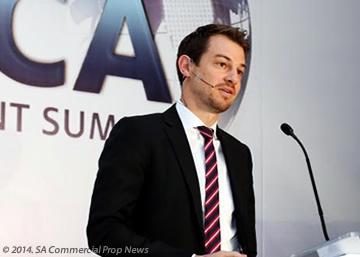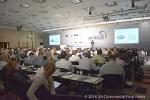Africa Property Investment a long but fruitful play
 Standard Bank Senior Political Economist, Simon Freemantle said property funds must recognise that Africa is a long term game. Various things must fall into place for each business to thrive there and things differ from country to country.
Standard Bank Senior Political Economist, Simon Freemantle said property funds must recognise that Africa is a long term game. Various things must fall into place for each business to thrive there and things differ from country to country.
Despite the challenges, majority of SA’s listed property funds which have ventured into other African countries have chosen to start with shopping centre developments.
This was revealed at the Africa Property Investment Summit which took place at the Sandton Convention Centre on 13th to 14th October.
Various speakers including property company executives, sector analysts and economists said South African property funds may find it difficult to make quick profits from malls on the continent because of the lack of spending power of most Africans. However, there are pockets where people have shown a desire to spend and have done so making large profits for shopping centre owners.
“The funds must recognise that Africa is a long term game. Various things must fall into place for each business to thrive there and those things differ from country to country,” Senior Political Economist at Standard Bank, Simon Freemantle said.
If not to develop malls, the funds will buy them. Retail-focused property fund, Hyprop Investments and very busy developer Atterbury Africa, both have stakes in various malls in Africa.
Hyprop owns 17.6% of Accra Mall in Ghana and 68.8% of Manda Hill in Lusaka, Zambia. Atterbury Africa is the other main shareholder of both malls.
Hyprop reported in its recent annual report that the African continent excluding South Africa was responsible for just less than 10% of earnings in the financial year to June. Within three years, this could double to 20%.
Hyprop and Atterbury are not against developing malls too, as opposed to just buying stakes outright.
West Hills Mall and Achimota Mall are both being developed in Accra Ghana by the partnership of Hyprop and Atterbury Africa. Kumasi City Mall is being built in Kumasi.
While, Ghana appears to offer demand for malls, Nigeria, the most populated African country does not seem to have enough affluence to support mall developments that are especially grandiose yet. Nigeria’s population is more than 167-million people.
Nevertheless, in Nigeria, funds may need to develop malls first as opposed to buying existing malls and then trying to attract tenants from SA. One example of a tenant that will only enter other African countries if the mall culture and critical mass of shoppers is there already is Woolworths. The food and clothing retailer pulled out of Nigeria early this year, saying it had faced too many logistical headaches and costs.
Still JSE-listed Resilient Property Income Fund run by property mogul, Des de Beer recently started Resilient Africa to develop properties in Nigeria.
Resilient has a 50.98% interest in Resilient Africa, with Standard Bank and Shoprite as partners.
The joint venture has more than R2bn in equity and is building the 12,819m² Delta Mall in Warri, in Delta State, Nigeria. The other main project is a 12,291m² Mall in Owerri, in Imo State.
Resilient recognised the need to bring a large retailer like Shoprite which has established itself in the country.
“We have a long term strategy in Nigeria and we recognise where we can do well and where we are not going to do business yet,” De Beer says.
While Nigeria is a challenging if promising place to do business, other African countries further north are more developed and have better infrastructure.
SA’s Delta International which is the first pan-African property income fund and which will pay distributions to shareholders; has bought a mall in Casablanca, Morocco.
Delta International CEO, Louis Schnetler says funds believe there is a push for retail assets in Africa but one has to be clever about how ones fund react to this.
His fund targeted Morocco as starting point before venturing further into Africa for various reasons.
Delta International’s flagship property is the 30,000m² Anfa Place shopping centre in Casablanca. It is the second-largest mall in Morocco.
“You can buy existing malls or you can build new ones. Either approach comes with risks. People also miss that when you invest in Africa, each country is different. We recognise that with Morocco we have a large population of shoppers and spending power which we may not find in other countries yet,” he says.
He says many European countries use Morocco as a gateway to Africa. Spain has a ferry to the North African country.
A number of European tech and telecoms companies are opening their African offices in Morocco instead of SA.
London held private equity group with a focus on Africa, Actis, is also set to make more commitments to African projects.
The firm has injected about R5bn into residential, retail and office projects in the continent. The retail component has been relatively the smallest of the three with the focus primarily on offices and then residential. Traditionally, the firm develops an asset and then exits that property asset as opposed to managing it.
Stanlib Direct Property Investments Chief Investment Officer, Amelia Beattie said at the summit that Africa would take time for property funds to find themselves in but it would be on the radar of SA and global funds for a long time.
Most Popular
Watch: A Credible Market, the need for Standards in Property Industry
Valuation standards have a significant role to play in helping to regulate professional practice at national, regional and global levels, promoting professional ethics, integrity, impartiality and trust in valuer activities in the property industry. ... Full story











